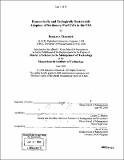Economically and ecologically sustainable adoption of stationary fuel cells in the USA
Author(s)
Bhaumick, Benjamin, 1967-
DownloadFull printable version (5.901Mb)
Other Contributors
Massachusetts Institute of Technology. Management of Technology Program.
Advisor
Lester C. Thurow.
Terms of use
Metadata
Show full item recordAbstract
Energy in various forms is essential to all human activity, be it leisure or business. Currently employed stationary energy generation technology is marked by relatively high emissions of pathogenic chemicals such as carbon dioxide, sulfur oxide and other criteria pollutants. These chemicals are proven to adversely affect human health and are suspected of influencing the global climate. Consequently, there is a high potential for damages in some parts of earth but also benefits in others, particularly to agricultural yields and weather related catastrophes. Last not least, current energy conversion is largely based on fossil fuels such as coal, gas and oil. On timescales relevant to humans, these sources are physically exhaustible and beyond that economically not sustainable. This thesis will provide details of renewable and therefore sustainable energy concepts as they support the emergence of hydrogen based stationary energy conversion using fuel cells. Given this premise, several sources of naturally available and long-term sustainable energy supply are identified, quantified and discussed with respect to their economical utilization. Wind energy, foremost, but also solar energy, hydropower and others are identified as viable options for generating hydrogen. Fuel cells provide the link between intermittent and randomly located renewable energy sources and demand properties. Given infrastructure availability will identify natural gas as the immediate but transitional hydrogen source prior to renewable energy being commercially viable at large scales. Since technical obstacles to fuel cell adoption can be overcome, this thesis will show that in a market economy, governmental intervention is inevitable for timely fuel cell (cont.) adoption. Hence, besides recommendations for private business activity this thesis will provide suggestions for federal and state intervention driving stationary fuel cell diffusion.
Description
Thesis (S.M.M.O.T.)--Massachusetts Institute of Technology, Sloan School of Management, Management of Technology Program, 2004. Includes bibliographical references (leaves 90-93).
Date issued
2004Department
Management of Technology Program.; Sloan School of ManagementPublisher
Massachusetts Institute of Technology
Keywords
Management of Technology Program.